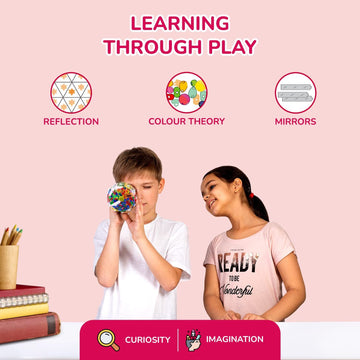
We are riding the crest of the third wave - a term used by futurist Alvin Toffler to describe our post-industrial era. By this term, he implied a society fuelled (and empowered) by democratization of access to information through advances in technology. In effect, a world we live in. From porn to wars, and communication to commerce, technology is acting as the tool revolutionising every sphere of human activity in this ‘digital age’. Not surprisingly, the most promising field where technology has the potential to usher in a whole new era is also the most critical for our society - education.
If technology is the most revolutionary tool that we as a society have, education is our most powerful weapon. Education has proven to be the single most effective defence against social ills like poverty and exploitation, and the most impactful enabler of social empowerment. Together, technology enabled education has the potential to transcend our (social, economic, infrastructural) limitations and transform human society. However, there is a rider. To truly unleash the potential of technology in education, we need to revise the very definition of education.
The educational ecosystem rests on three fundamental units - the child, the teacher and the learning (for which school or the educational system are the delivery mechanisms).
Albert Einstein famously said: Education is what remains after one has forgotten what one learned in school. This underlines a serious issue we as a society have failed to address - the purpose of education. Instead of preparing a child for ‘life’, most education systems are geared towards preparing a child for ‘work’. This situation is further compounded in the case of our country where, for millennia, access to education was restricted to a privileged few. This was replaced by a colonial goal of spawning an administrative ‘workforce’; which in turn has been substituted successively by the objective of churning out armies of drones - first ‘government servants’, next managers, and now, coders. We as a society have come to look upon education as the most efficient way to secure a ‘job’. Overpopulation and competition for securing livelihood further exacerbate the situation.
The one area where digital age has unquestionably empowered education is the delivery of information (educational system) - by obviating the traditional hindrances of infrastructure, economics and geography. Technologies like satellite communication, telecommunication bandwidths, the Internet, Augmented Reality and Virtual Reality (to name a few) have brought every bit of information within a student’s and a teacher’s reach. From exploring paleontology sites, to visiting Mars, and from seeing structure of an electron to understanding internal combustion engines, the best resources from the best academic institutions delivered by the best instructors is today accessible to anyone with a smartphone and an internet connection (both affordable to the entire economic spectrum of society).
However, Digital Age or Stone Age, technology cannot solve certain social issues that continue to negatively impact our attitude towards education. Teachers are the cornerstone of our education system. They are the shapers of the children who are going to shape the future. Ideally, the best minds should perform this duty. Teaching should also be the highest paid job so that it attracts the best minds. Unfortunately, despite the critical role teachers play in the building of a society, teaching continues to be among the least lucrative professions.
Traditional education systems were designed to make information about the past available to a student, the assumption being, they would be able to handle similar situations in the future. But the digital age has killed the very concept of ‘predictability’. Today, the role of the education system and the teacher has to evolved from ‘introducing students to the past’ to ‘empowering students to shape the unpredictable future’. Very few teachers are inherently prepared for this, and the education systems are severely lacking in training them for this huge responsibility. The over-emphasis on right-or-wrong evaluation also needs a relook where children are encouraged to create, make mistakes, and explore beyond set objectives. Digital age offers countless tools to facilitate this, but the systemic approach needs to be redefined.
While digital age is touted as the panacea for all the ills afflicting education, the overdependence of technology is having a negative impact on children. Generation-next, so comfortable using tablets and smartphones from birth, is finding it difficult to tie shoe-laces (motor skills) due to lack of physical activity. There is an imminent danger of reliance on digital technology alienating the physical element from education.
Read Also: Factors That Affect Growth & Development in kids.
Jean Piaget, the pioneer of child psychology, puts our predicament in perspective. He emphasized, “The goal of education is not to increase the amount of knowledge but to create the possibilities for a child to invent and discover, to create men (and women) who are capable of doing new things.”
Like every tool, technology is only as good as its user. And we as the users of technology owe it to our coming generations to realign our attitudes to benefit and encourage young minds to shape a brighter future. Unless we reorient our definition of education, all the possibilities offered by this third wave will only burden generation-next with the same ills that we are so vehemently trying to abolish.































